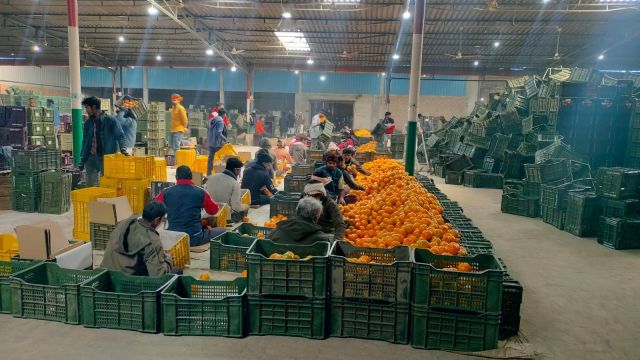Kinnow returns to mid-day meal in Punjab but not a lot to cheer for farmers
Punjab schools are now primarily purchasing kinnow from local retailers, which means farmers are unlikely to gain direct benefits from these sales.
 Introducing Kinnow on Saturdays may decrease its consumption, as the second Saturday in January is already an off day, and schools were closed on the first Saturday of that month due to extended winter vacations.
Introducing Kinnow on Saturdays may decrease its consumption, as the second Saturday in January is already an off day, and schools were closed on the first Saturday of that month due to extended winter vacations. The Punjab government has reintroduced kinnow as the weekly fruit in the mid-day meal scheme for government schools, effective from January 1. Since schools will reopen after the winter vacation on Wednesday, the implementation will take place afterwards.
Varinder Singh Brar, general manager of the Punjab Mid-Day Meal Society, said, “We have reintroduced kinnow in the mid-day meal and it will be distributed every week on Saturdays.”
It is estimated that once the 19,120 government schools in the state implement the order, nearly 19 lakh students studying up to Class 8 will consume around 3 lakh kg kinnow each month, assuming the fruit, which is considered the most healthy among all citrus fruits, is distributed over three Saturdays since the second Saturday is a holiday.
However, farmers in the kinnow belt are unsure how schools will purchase the fruit this year. Last year, Punjab Agro was responsible for directly purchasing from farmers and then distributing the kinnow to schools. But schools are now mainly buying the fruit from local retailers, which means farmers are unlikely to benefit directly from these sales.
Additionally, introducing the fruit on Saturdays may decrease its consumption, as the second Saturday in January is already an off day, and schools were closed on the first Saturday of that month due to extended winter vacations.
Last year, kinnow was introduced into the mid-day meal after extensive discussions that began in the first week of February. Punjab Agro purchased the kinnow directly from farmers during this period. “There was a kinnow surplus last year, and farmers were in distress; aid arrived very late. However, farmers could still sell some of their stock to Punjab Agro, which then supplied it to schools. The weekly consumption of kinnow in schools is approximately 40,000 quintals, benefiting students up to Class 8,” said Darshan Singh Giddranwali, a kinnow farmer and union leader of Bharatiya Kisan Union (BKU) Rajewal.
“However, this time, farmers are unaware that kinnow will be included in the mid-day meal. As a result, school heads will purchase it directly from the market, meaning that the primary beneficiaries will be the retailers rather than the farmers. Nonetheless, something is better than nothing, as the kinnow will ultimately be coming from our fields,” said Sukhmander Singh, president of BKU Rajewal.
School heads have started purchasing kinnow from the local market due to difficulties faced last year with Punjab Agro’s distribution of the fruit. “Teachers were made to wait hours to pick up the stock during school hours, making the process very cumbersome. We are buying all seasonal fruits from the market, and we will purchase kinnow similarly. If Punjab Agro had improved its distribution, it would have benefitted the farmers more,” said Pawan Kumar, press secretary of the Democratic Teachers Front (DTF).
Under the mid-day meal scheme, officially called the Pradhan Mantri Poshan Shakti Nirman (PM-POSHAN), government school students up to Class 8 receive a fruitonce a week, with a budget of Rs 5 per student. This scheme was launched on January 1 of last year. Initially, the Punjab government announced that bananas would be distributed. However, following objections from teachers and farmers, this was changed to kinnow in February 2024. However, kinnow was distributed for only three to four weeks last year.
No choice but to reduce area under kinnow, say farmers
Many think the government should have introduced kinnow into the mid-day meal much earlier. “They should have started from December, as the season begins in November. However, good quality, sweet, and juicy kinnow is available from December onward. We approached the Fazilka deputy commissioner twice and alsocontacted Punjab Agro’s Abohar office but to no avail. What is the Punjab government’s role in promoting diversification?” asked Sukhmander Singh, president of BKU Rajewal in the Fazilka district.
“The farmers into diversification should be given the first preference, but this is not the case here. If the state is not going to support us, we have no choice but to reduce the area under kinnow. Last year, many kinnow orchards were uprooted,” said Sukhmander.
He added that 90 per cent of the state’s kinnow is grown in the Abohar constituency of the Fazilka district, and it was strange that the Fazilka district commissioner had not bothered to respond to their request for a meeting with kinnow farmers about the introduction of kinnow in mid-day meal.
In Punjab, 47,000 hectares are dedicated to kinnow cultivation. Of this, nearly 35,000 hectares are in Abohar alone, while the remainder is in Muktsar, Hoshiarpur, and other regions. “Last year, approximately 1,000 hectares of kinnow were uprooted, but this year, 1,500 hectares have been added. Therefore, the overall area under cultivation is increasing,” said Shailendra Kaur, director of horticulture in Punjab.
This year, kinnow prices are significantly higher, ranging from Rs 25 to 30 per kg compared to Rs 5 to 15 per kg last year. Despite this increase, farmers believe that dedicated purchases by the government would support kinnow growers.
Abohar MLA Sandeep Jakhar, who had raised the issue of including kinnow in the mid-day meal last year, said, “Even last year, they could not execute it properly. They have yet to start this year, especially since schools are closed. Let us see how they plan to move forward. They could also include carrots, which are nutritious. The main idea is to take the initiative and support farmers in diversifying their crops. Agriculture is a state subject, and the state government needs to focus on it seriously.”







